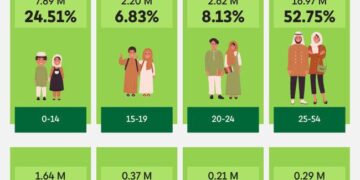Foshan Drives Digital Innovation to Revitalize Traditional Industries
Foshan, a dynamic manufacturing powerhouse in southern China, is undertaking a transformative push to digitize its longstanding industrial sectors. This initiative aims to enhance operational efficiency, strengthen market competitiveness, and promote sustainable development by encouraging industries such as ceramics, furniture production, and textiles to adopt cutting-edge digital technologies. Aligning with China’s broader national strategy for digital economic growth, Foshan’s efforts mark a critical turning point in modernizing legacy industries through smart manufacturing and advanced technological integration. This article delves into the city’s comprehensive approach toward this transformation and evaluates its potential effects on local enterprises and the regional economy.
Modernizing Foshan’s Traditional Industries Through Digital Innovation
Foshan is embarking on an extensive campaign to embed sophisticated digital tools within its core industrial sectors—cementing its role as one of China’s foremost manufacturing hubs. The focus lies in boosting productivity by leveraging intelligent manufacturing systems that streamline processes and reduce waste. Central technologies driving this shift include:
- Artificial Intelligence (AI): Deploying AI algorithms for optimizing production workflows.
- Big Data Analytics: Utilizing vast datasets to refine decision-making processes and gain deeper customer insights.
- Internet of Things (IoT): Enabling interconnected machinery for real-time monitoring and automation.
This strategic adoption not only enhances Foshan’s competitive edge but also aligns with global sustainability targets by promoting energy-efficient operations. To track progress effectively, authorities have outlined specific key performance indicators (KPIs), including:
| KPI Metric | Goal by 2025 |
|---|---|
| Production Efficiency Improvement | Achieve a 25% increase |
| Reduction in Energy Usage | Curtail consumption by 15% |
| Annual Workforce Training Capacity | Educe skills training for 3,000 employees each year |
Empowering Small Businesses to Adopt Digital Technologies in Foshan
Small enterprises form the backbone of Foshan’s traditional industry landscape; thus facilitating their transition into the digital era is vital. A holistic strategy combining targeted education programs with community-driven support networks can ease this shift significantly. Customized workshops focusing on practical competencies—such as managing online storefronts, harnessing social media marketing strategies, or delivering superior digital customer service—are essential components.
Moreover, fostering collaboration among small businesses encourages resource sharing that demystifies technology adoption while reducing costs through collective bargaining or shared platforms. Partnerships between local tech firms offering discounted software solutions further lower entry barriers.
Public awareness campaigns play an instrumental role in illustrating how embracing digitization translates into tangible business benefits like expanded market reach or revenue growth. For instance:
| Sales Channel Type | % Annual Revenue Growth Rate* | Market Reach Scope* |
|---|---|---|
| Conventional Sales Methods
Localized Customer Base Global Audience Digital Sales Platforms 20% *Data based on recent industry reports from Guangdong Province. *Data based on recent industry reports from Guangdong Province. *Data based on recent industry reports from Guangdong Province. *Data based on recent industry reports from Guangdong Province.* Traditional Sales |
Bridging the Skills Gap Through Multi-Sector Collaboration in Foshan’s Digital Economy Drive
As Foshan accelerates its push towards digitization across traditional industries, addressing workforce skill shortages becomes paramount. Effective collaboration among educational institutions, private companies, and government bodies can create robust frameworks that prepare talent pools equipped for emerging technological demands.
Local universities are revising curricula to emphasize competencies such as data analytics proficiency and AI application relevant to manufacturing contexts.Simultaneously,< /a>bustling enterprises offer hands-on internships enabling students direct exposure to real-world challenges.
Government agencies facilitate these partnerships through policy incentives encouraging corporate investment in employee upskilling programs while funding innovation incubators focused on developing bespoke solutions tailored for traditional sectors.
Key collaborative initiatives include:
- Bespoke Training Modules: Courses designed around emerging tech trends impacting local industries.
- Aptitude-Building Internships: Structured apprenticeships bridging academic theory with practical application.
- Sponsorship Grants: Financial backing supporting joint ventures between startups innovating digitally & established manufacturers seeking modernization.
< /ul >< strong >Stakeholder< / strong > < strong >Function< / strong > < strong >Contribution< / strong >
< / tr >
< / head >< strong >Academic Institutions< / strong > Curriculum Innovators< / td > Develop specialized courses aligned with industrial needs.< / td >
< / tr >< strong >Industry Players< / strong > Training Facilitators & Mentors Provide internships & practical training opportunities.< br /> . . .
< br />& nbsp;
Government Bodies</p>
<p style="margin:0px;padding:0px;">Policy Makers</p>
<p style="margin:0px;padding:0px;">Enable partnerships via funding schemes & regulatory support.</p>
<br /><br /><br />
</body>
</html>& nbsp;
& nbsp;
& nbsp;
& To Conclude:
The concerted effort underway in Foshan represents more than just technological upgrades—it signals a fundamental reshaping of how traditional industries operate within an increasingly connected global economy. By integrating innovative technologies alongside workforce development initiatives, a new benchmark emerges demonstrating how tradition can harmoniously coexist with innovation,”—a model poised to inspire similar transformations throughout China and beyond amid rapid global shifts toward Industry 4 .0 . The path ahead will undoubtedly present challenges but equally offers substantial rewards as Fos han evolves into a digitally empowered industrial leader.















